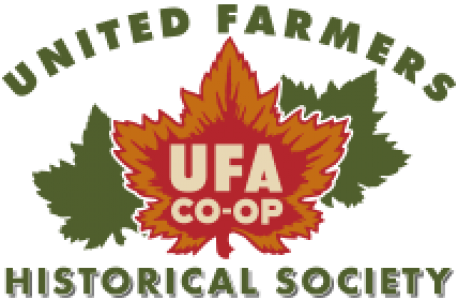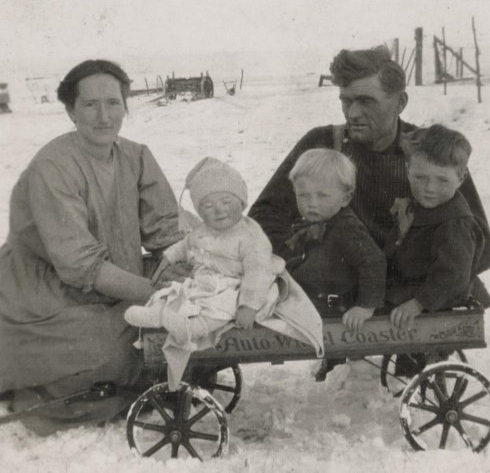In 2022, the United Farmers Historical Society acquired an original copy of the poem “It Beats the Devil” compiled by the United Farmers of Alberta Mount Vernon Local at Three Hills, Alberta. This poem illustrates a game of politics that must be won by the United Farmers of Alberta in order to beat the devil. The poem mentions various “threats” such as communism, drought, immigration, federal government, unions, etc. that the devil uses to spark chaos. “It Beats the Devil” depicts a turning point in Alberta’s political history that saw farmers elected to a majority in the U.F.A. provincial government in 1921, and remained in office until 1935.

This poem would have been composed sometime after July, 1921 (the date of the provincial election) and before January, 1923 when an excerpt of the poem was recited at the U.F.A. Annual General Meeting by Three Hills resident N.F. McKinley.
William Arthur (Art) Milan was a member of the Mount Vernon U.F.A. local #858 and is credited with composing “It Beats the Devil”. Although there is no definitive proof that Arthur was the author (as his name is not attributed on the printed version, but more generally by the U.F.A. Mount Vernon Local), its meter, style, vocabulary and perspective are similar to other material produced by him in his collective work.


William Arthur Milan was born December 5, 1882, at Hancock, Minnesota. Better known as Arthur or Art (and Pop to his children), he hopped onto a shipping car (carrying livestock and equipment) and travelled to Calgary in 1905. He paid his way by taking care of the animals aboard the train cars. A few years later, Art filed for a homestead in the Ghost Pine Creek district of Alberta where he built a fourteen by sixteen foot sod house and grew wheat. Arthur married Laura McGhee on January 29, 1913, and together they had thirteen children, nine of whom reached adulthood. Arthur was also an inventor and patented his own Harrow Cart.

Arthur was well known in his community as a poet and musician. Throughout his life, he recorded the joys and sorrows of family and friends in his poetry including the titles “Life In The City”, “What Does Home Mean To You?” and “The Deserted Ranch”. Arthur’s granddaughter Laura remembers that Arthur was often asked to speak at concerts, celebrations and community gatherings where he would sometimes pull papers from his jacket pocket, while also ad libbing to always bring a laugh to the audience. From Laura’s perspective Pop took great pleasure in sharing his creative talents with family and friends. And even though Art was born December 5th, he insisted on celebrating his birthday September 10th, perhaps a better day for gathering folks together under the prairie sky.
While most remembered for his poetry, Arthur was also a self-taught musician and accomplished fiddle player. In the memoir of his daughter, Gladys, she wrote “he had a good ear for music…learning his first tunes listening to his mother whistle. He played Irish jigs and lilts and the modern music he liked. In the early days he played solo for dances.” Arthur’s son James remembers playing with his father and brothers in the family band and they enjoyed sharing their love of music at dances and other community events. Arthur’s work also includes the radio drama “Wayne King And His Kitchen Troubadours” which was presented at the Mount Vernon School Christmas concert (c. 1937).
Arthur sold his farm after the Second World War and moved to Calgary where he ran a corner store in the Kensington neighborhood for a few years. He then moved back to Three Hills where he remained until his death on September 30, 1947. He is fondly remembered by his children and over 50 grandchildren. For more information on Arthur and the Milan family, see Rambles of a Rube for a compilation of his writing along with biographical information and photographs.
James Milan, Art’s eldest son inherited the collection of his father’s writing, including the poem, “It Beats The Devil”. In 1959, Arthur’s papers were given to James’s eldest daughter, Laura Smith [née. Milan]. In 2021-2022, Laura and her cousin Gerald Roden, digitalized the collection titled Rambles of a Rube. This digital file, along with an original copy of “It Beats the Devil” was donated to the United Farmers Historical Society archives in March of 2022. Two print copies of the poem were included in W. Arthur Milan’s personal collection. The second copy, with edits by W. Arthur Milan, has been kept with the collection of W. Arthur Milan works at the Provincial Archives of Alberta.
The United Farmers Historical Society would like to thank Gerry Roden and Laura Smith, descendants of W.A. Milan, for their generous donation to the archives and the history and images they provided to use in this blog post.
If you have a donation that you would like to discuss, please contact archives@ufa.com.










